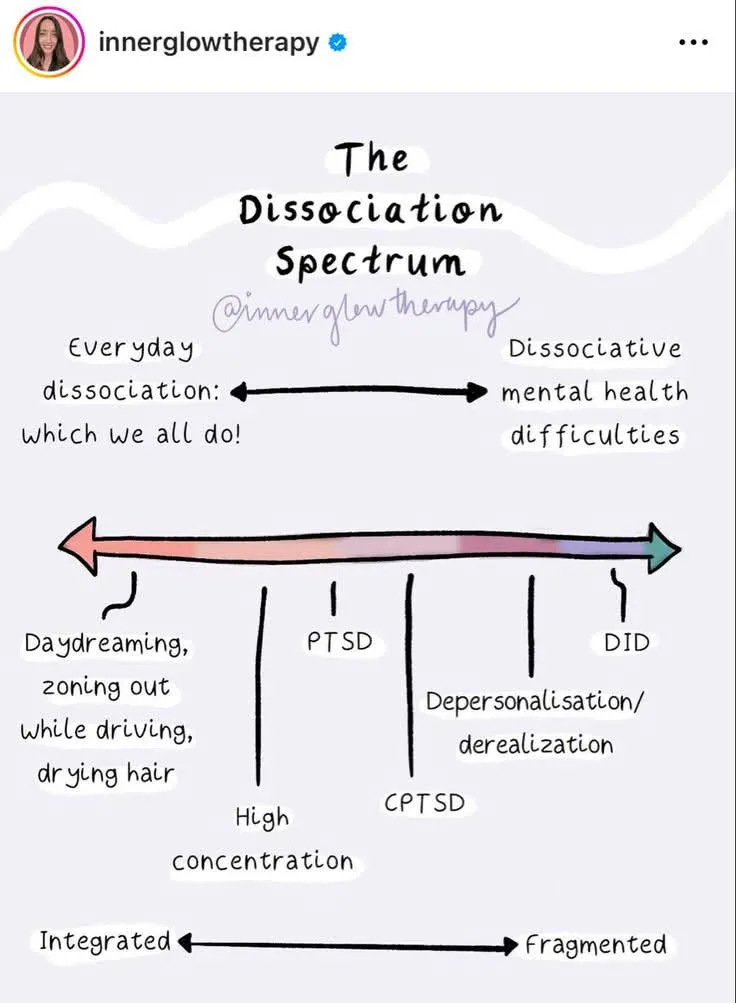Table of Contents
Dissociation and Plurality
This page is here to explain dissociation in more depth, and how it connects to our experience as a plural system. It's okay if this all sounds unfamiliar or a little strange -- we're not trying to be experts or speak for anyone but ourselves. We just want to help make sense of our inner world.
What is Dissociation?
Dissociation is something almost everyone experiences. At its core, it's a disconnection -- from thoughts, memories, emotions, the body, or even reality. It's not always a sign of something wrong; in fact, it's often a really effective survival mechanism. Dissociation exists on a spectrum, from very ordinary moments to deeper, more complex experiences that can come from trauma.
Here's a quick walk through that spectrum:
-
Daydreaming
Getting lost in thought, zoning out in a meeting, imagining a whole scene in your head. Harmless, common, and very human. -
Highway Hypnosis
Driving a familiar route and suddenly realizing you don't remember the last several miles. You were functional, just not fully "there." -
Deep Concentration
Getting so immersed in a task (reading, coding, art, etc.) that you lose track of time or awareness of your surroundings. -
PTSD
After trauma, the brain can disconnect from certain thoughts, emotions, or memories to protect itself. Flashbacks, emotional numbing, and avoidance can all be forms of dissociation. -
CPTSD
With ongoing or repeated trauma, this disconnection can become more chronic. Emotional numbing, memory fragmentation, and identity confusion are common. -
Depersonalization / Derealization
Feeling like you're not real, or like the world around you isn't real. These can be fleeting or persistent, and often feel very unsettling. -
DID / OSDD
When the brain walls off parts of itself to survive overwhelming experiences, it can result in distinct parts (or people) sharing a body. These systems may or may not experience memory gaps between members.
What is Plurality?
Plurality is when more than one distinct self, identity, or consciousness exists in one body. These selves -- often called parts, headmates, or Crew members in our case -- might have their own names, roles, ways of thinking, and emotional responses.
Plural systems form for different reasons. Some are trauma-based, others might form through different neurological or psychological mechanisms. Some systems don't know exactly why they exist -- and that's okay too.
Being plural doesn't always mean having amnesia or switching in dramatic ways. In systems like ours, there's often shared memory and co-consciousness, where multiple members are aware of or participating in life at the same time. That doesn't make us "less" plural -- just different in how it shows up.
Plurality isn't inherently a problem. For many systems, including us, it's a source of resilience. It can also come with challenges -- communication, coordination, emotional intensity -- but we navigate those together.
We know this may take some time to wrap your head around. That's okay. We've had to do that too. We don't expect anyone to understand it all right away -- we just ask for curiosity and compassion as you get to know us.
Let us know if you'd like to learn more, or visit our Crew Page to meet the people who make up Starship Voidfish.
